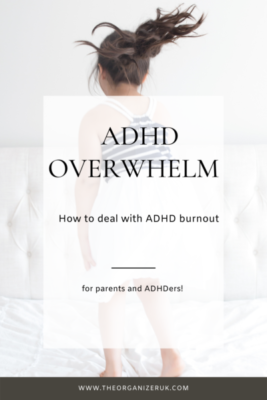Organising, Parenting
How To Overcome ADHD Overwhelm & Burnout and Find Relief
Are you struggling with dealing with ADHD overwhelm? Learn how to manage your or your child’s symptoms better with these practical tips to avoid burnout.
For the ADHDers of this world, hats off to you for dealing with the daily struggle of just getting through the day.
To the parents of kids with ADHD, I know exactly what you’re going through!
Everyone gets overwhelmed at times. Getting overwhelmed is perfectly natural, especially if you are a parent of small children, but ADHD overwhelm is more complex and often relentless.

What is ADHD overwhelm?
The ADHD brain does not work in the same way a neurotypical brain works and can leave people with ADHD feeling:
- Overwhelmed by tasks
- Overwhelmed by emotions
- Social overwhelm
- Easily distracted
- Like a failure or not good enough.
- Chaotic
- Overwhelmed by information
- Overwhelmed by the disorder.
- Frustration
- Anxiety
- Anger
- Overwhelmed by clutter
- Overwhelmed by too many choices
ADHD overwhelm for parents
Dealing with a child with ADHD can be overwhelming and lead to:
- Feelings of hopelessness
- Feeling like a failure as a parent
- Not knowing how to parent your child
- Feeling as if you have let your child down
- Feeling as if you can’t cope
- Sadness and despair
- Worry
- Feeling overwhelmed
What is ADHD?
ADHD stands for Attention Deficit Hyperactivity Disorder. It is a neurological disorder that can affect impulse control, social skills, emotions, hyperactivity, and concentration, along with so much more! The criteria for being diagnosed with ADHD is a list of at least 18 symptoms and sometimes up to 100.
Understanding ADHD is quite complex, as it is often accompanied by other disorders such as ASD, OCD, ADD, depression, anxiety, and many others.
ADHD can be difficult to diagnose as it also has very similar traits to ASD and attachment disorder.
ADHD is often more difficult to diagnose in women making it difficult to get treatment from some ADHD specialists. ADHD can be both perplexing and frustrating to understand. And as a parent, it can be a very bumpy ride!
Understanding the ADHD brain.
The nervous system regulates attention and emotions differently in a person with ADHD than the nervous system of those without the condition.
Impulse control.
Suppose for a minute that our impulses are blue fish jumping out of the water and that we also have the same amount of red fish that stop us from acting on our impulses. People with ADHD have lots more blue fish than they do red fish, so they can often act impulsively and inappropriately without being able to control their behavior. Sometimes children with ADHD can be aggressive as they can not control their impulse to injure and harm others. Dealing with an aggressive child can be particularly distressing for parents and lead to feelings of hopelessness and failure.
Hyperactivity
Hyperactivity is one of the symptoms of ADHD that most people are aware of. A person with ADHD often can not sit still. They may have very little awareness of danger, so they may climb, hang out of windows or jump from great heights without thinking about the consequences.
People with ADHD may be prone to ticks, twitching, restless leg syndrome, and Tourettes.
You might find that a child with ADHD can unlock doors and windows and escape at the drop of a hat. My child is ten years old, and we still have to hide the window and door keys!
IQ
Often people with ADHD have a higher IQ than neurotypical people. They are great problem solvers and frequently leave their peers behind when it comes to logical thinking. If you’ve got a problem that needs fixing, give it to someone with ADHD!
Concentration and attention.
Again this is a complex area because people with ADHD are often hyper-focused or zoned out, especially when they are interested in something. This can mean that they while away the hours on something that they are focused on rather than doing mundane jobs like homework or housework. This can often lead to things not getting done and can cause overwhelm.
If the ADHD brain isn’t interested in the task at hand, it will search franticly for something more interesting to do, so that’s why your child may take an hour to get dressed in the morning. If you’re an adult with ADHD, you will find that you started to do one task and ended up with a trail of unfinished tasks behind you!
Often people with ADHD like to leave tasks to the very last minute and use this deadline as a motivator to get the job done.
Even though children with ADHD are intelligent, clever, and bright, they often get overlooked at school due to their inability to focus on subjects that bore them. Medication can help to bring that focus together during school hours.
To read how medication changed our son’s life read this post.
Tantrums and meltdowns.
Often children with ADHD get overwhelmed and can’t adapt to changes in routine. They often need to know precisely how the day will pan out, and any veering off that path sends them into an emotional meltdown similar to that of a toddler.
Sleep and insomnia.
Children with ADHD never seem to get tired and can run on almost no sleep. They are often the last ones up at night as they usually fall asleep after everyone else and are always the first up in the morning. Getting a child to bed with ADHD is an almost impossible task every night, no matter how much exercise or how busy they have been throughout the day.
Prioritization and time management.
People with ADHD do not do well with prioritization and time management because they do not think it’s important. They work on a completely different set of rules than the rest of the world. Most of us do things because we don’t want to suffer the negative consequences if it doesn’t get done. Or we do it because we know the reward for doing the task will be great. Both of these dangling carrots are of little importance to an individual with diagnosed ADHD, they may have a list of urgent tasks, but none of them are important enough for them to start. There is no task more important than the other because to the ADHDer, they all look equally as unimportant!
So now we know a little bit more about ADHD symptoms, what do we do about ADHD overwhelm?
ADHD Overwhelm in adults and teens
We have established why and how you feel overwhelmed, so how can you get motivated to get onto the task you know you should be doing?
Every time you are in the zone, think about the trigger or motivation that made you get into the zone. So, for instance, if you spent five hours creating Anime cartoons, what triggered you to do that? Write it down. It could look something like this:
- Helping someone
- Competing with someone
- Wanting to impress someone
- Wanting to learn a new skill
- Wanting to do something properly
You will have your own triggers for getting in the zone, and I’m sure your list will be huge! Once you have established what gets you in the zone, you can apply that to one of the tasks on your list.
So, for instance, if you feel overwhelmed by the amount of homework you have, you might want to try to consider impressing your parents or teacher by getting as much of it done as you can by getting in the zone. Your list will probably be endless, but the skills you have on your list are probably better than those of someone without an ADHD diagnosis for getting you out of the overwhelm.
Instead of trying to fit into the world around you, use your skills and superpowers to tackle the most mundane jobs. Do them your way, and in your time, no one says that everyone else’s way is the right way. Trying to do tasks everyone else’s way is what’s stopping you in your tracks and causing you ADHD overwhelm paralysis where you feel so defeated you get stuck and can’t even make the first small step.
Do things your way. It’s the right way for you, and that’s what matters!
Try this simple checklist for quickly getting through chores when you’re short on time and motivation.
Parents with ADHD children.
I could take all day to chat on this subject, as I’ve been thoroughly exhausted and overwhelmed for the past ten years!
There are many reasons to feel overwhelmed, just as other parents do. However, ADHD overwhelm is relentless and can come in many forms.
- Sleep deprivation
- Worry and anxiety
- Depression
- Feelings of despair
- Anger
- Overwhelm
Most parents are tired, and I get that. However, most parents find that the tiredness starts easing as their child ages. Parents with children with ADHD often find that the intensity of parenting gets more challenging as their child gets older.
Children with ADHD are complex characters as they often have other issues such as insomnia, anxiety, depression, and many more to deal with.
Why do parents of ADHD children feel overwhelmed?
Sleep deprivation. Anyone with a child with ADHD will know that it is almost impossible to get them to sleep, weighted blankets can help, but you’ve got to get your child into bed first!
It can be 1 am before my son gets to sleep some nights. As parents, staying awake until your child goes to sleep is exhausting. Usually, this phase stops after the toddler years for parents with neurotypical children, but not for parents of kids with ADHD; it doesn’t get better with age!
Having a child up until 1 am every night has a knock-on effect on the parent’s relationships. There’s no time to recharge, watch tv or have a long soak in the bath. You are always listening out for your child flooding the bathroom, waking up their sibling, or putting lipstick on the cat. ADHD parents are on high alert all the time. There is no downtime, EVER!
Worry and anxiety. Most parents are worried and concerned about their children, and I get that. Parents of children with ADHD have to pre-empt every move their child will make (similar to a toddler) because their child has a minimal concept of danger. They like to climb, swing, and crawl in dangerous places and have to be micro-managed most of the time to keep them safe.
Their child’s difficulty in controlling impulses gives the parent incredible stress as they never know what their child will do next. A water bottle poured over a bed, a tub of baby powder emptied into the washing basket. You name it. Their child will do it.
Parents worry about what path their child will take in adult life. They fear that the chaos and behavior that their child displays now will spill over into adulthood and lead to prison or drug abuse. The opposite is true, as people with ADHD are often successful and excel in their chosen field of work, but it doesn’t stop us from worrying!
We worry that other parents judge our child’s behavior, especially if the child is exceptionally hyper in public or has an emotional breakdown. It gets more complex as the child ages because onlookers can’t understand why a ten-year-old has a tantrum in the supermarket.
It’s hard to be judged by others, but now after ten years, I’m just about getting used to it!
Depression. It’s so easy to get overwhelmed with the lack of downtime when you parent a child with ADHD. If we don’t find time to recharge our batteries, it can be a downward spiral into despair and depression.
Anger. When your ADHD child is overwhelmed by emotions, in the middle of a meltdown, is lashing out violently toward you, or smashing up the home, it can be challenging to stay calm and collected. Sometimes the breakdowns can go on for hours, and it can be exhausting trying to calm and regulate your ADHD child and stay calm and control yourself.
Overwhelm. Life with an ADHDer is overwhelming and exhausting as you permanently put out fires and pre-empt their next move. You find yourself with zero free time and very little help!
What can help with ADHD overwhelm?
Seek help. If you feel overwhelmed, seek help from your GP, who will provide medical advice for you or your child. They may suggest ADHD treatment such as medication to help regulate your child to enable them to concentrate at school. They may recommend melatonin to help your child sleep at night, which will give him the rest he deserves. Medication has been life-changing for our son. Read more about our decision to medicate our child here.
A medical professional may suggest parenting courses or books to help you understand how the ADHD brain works and how you can adapt your parenting skills to minimize meltdowns and calm emotions. Once we understood that our child couldn’t help his behavior, it helped us enormously
Read. Read as much as you can about ADHD. The magazine ADDitude is a great place to research ADHD and keep up with the latest ADHD news.
Talk to other parents. Talk to other parents who are going through the same struggles as you. Facebook groups are an excellent place to seek advice. I’m a member of a few groups, so I might see you over there! You can always drop me a line at my email address, and I will answer any questions if I can!
Talk to parents with grown-up ADHD children. It was a game-changer for me to see how these parents had struggled but now have successful adult children doing well in the world. It helps to alleviate some of the worries about our children’s future.
Make time to recharge. I know this is not easy, as finding help and child care can be impossible. If you can, try to look after yourself. Here is a quick self-care checklist for those of us with very little time on our hands.
This is a warts and all post about ADHD, but I couldn’t finish until I have reiterated that although parenting a child with ADHD is incredibly tough, it is the most rewarding thing I have ever done. My child makes me proud every day and completely fascinates me. As with every other ADHDer, he’s an extraordinary, kind, loving, clever, funny kid and, ultimately, the love of my life. There are so many positive traits to ADHD that I’m determined to write a post about them too one day, so don’t forget to sign up for my updates and get them straight to your inbox!


